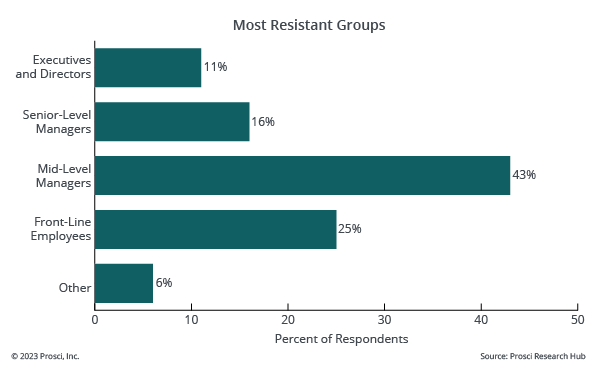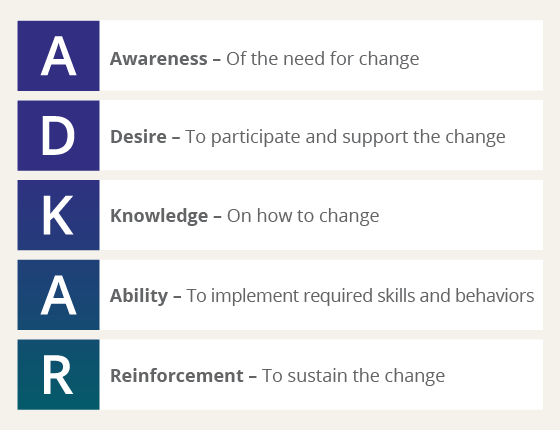Understanding Why People Resist Change

4 Mins
Updated: November 18, 2025
Published: March 9, 2022

Why do people resist change? It's natural and human response to change but far more than an emotional issue. As change management practitioners, it is our job to understand the root causes of resistance within teams, so we can help people move through their individual transitions and successfully adopt important changes.
Resistance to Change by Group
In Prosci's Best Practices in Change Management research, participants identified the groups from which they experienced the most resistance. Mid-level managers were the most resistant group, followed by front-line employees. These findings are consistent with previous studies.

Why Do Employees Resist Change?
Although employee resistance has many causes, Prosci research reveals five primary reasons:
- Lack of awareness about the reason for change
- Change in job role
- Fear of the unknown
- Lack of support from or trust in leaders
- Exclusion from change-related decisions
Lack of awareness
The top reason employees resist change is because they lack of awareness about the purpose and reason for the change. This arises from the organization's failure to communicate details and business reasons for the change, as well as a lack of clarity about employee roles in change success. Resistance occurs when employees can't answer, "What's in it for me?"
Prosci ADKAR® Model

Change in role
Resistance occurs when changes are required in an employee's role. These can include workload increases, job description changes, or new behavioral requirements. When role changes are required, employees often lack desire to learn a new system or technology. Others are concerned about the time they have to adopt changes, a lack of incentives, and decreased autonomy and control. Resistance can also occur when an employee loses power, status or identity.
Fear of the unknown
Fear is a significant cause of resistance among employees, especially fears about job loss and lower compensation. Uncertainty about their own future and the future of the organization arise due to past experience with failed changes. Employees grow insecure about their ability to perform well with new technology, fear changes to organizational culture, and fear the possibility of increased evaluation and monitoring. Employees with longer tenures fear change more than newer employees because of the depth of their comfort with the old ways of doing things.
Lack of support from and trust in management or leadership
The nature of resistance to change is such that people managers and and leaders influence employee resistance. Often, managers display higher resistance and reduced support for change. This poor role modeling has a direct impact on employee behaviors and their support for the change. Previous negative experiences also increase resistance among employees who lack trust in executive leadership and fear a disconnect with or inadequate support through the transition process.
Exclusion from change-related decisions
Employees who are not included in the decision to change and the design of solutions often resist change. Commonly, front-line employees feel unheard as as well threatened, betrayed, blind-sided or targeted by the change. Employees want to be a part of the process of preparing, equipping and supporting people, as well as contributing to the change sequencing. Transparency and communication in the planning process is important to counteracting this resistance.

For a deeper understanding of employee resistance and personalized strategies to address it, you can ask Kaiya™, Prosci's expert AI tool. Kaiya provides insights and solutions tailored to your specific change management needs.
Learn More About Kaiya
Why Do Managers Resist Change?
Prosci research participants identified five primary reasons managers resist change:
- Organizational culture issues
- Lack of awareness and knowledge about change
- Lack of support and commitment for change management
- Misalignment of project goals and personal incentives
- Lack of confidence in their ability to manage change
Organizational culture
Participants report that organizational culture is a primary cause of resistance. Specifics include risk-averse cultures, past negative experience with change, groupism versus organizational dedication, and issues such as mistrust across departments and reporting levels. In cultures devoid of sponsorship in which leaders and direct supervisors failed to support them, managers feel undermined.
Lack of awareness and knowledge about change
Research shows that managers resist change due to a lack of knowledge about what a change entails, lack of information and understanding about the return on investment (ROI) and reasons for change, and lack of knowledge about What’s in it for me?”
Lack of support and commitment
Resistant managers may believe the change is a bad solution or that it will fail. They may be comfortable with the status quo or believe the change is misaligned with company goals. Some dislike what the change entails or requires of them. Others fear losing control, power or status, or they don't want increased visibility or accountability.
Misalignment of project goals and personal incentives
Research reveals that issues on the project management side of changes consistently cause manager resistance. This includes the pace of the change, lack of metrics, metrics that don't align with parameters for promotion, or misalignment with pay, bonus scales, and incentives. Participants acknowledge that these deterrents or a lack of incentives make change unappealing to managers.
Lack of confidence in their ability to manage the people side of change
Manager resistance is often due to their inability to be a leader of change and facilitate its adoption. Some managers resist because they lack the skills to effectively manage resistance in their teams and communicate difficult messages to direct reports.

How People Resist Change
How will you know resistance when you see it in your organization's people? Participants in Prosci's Managing Resistance to Change research study shared numerous examples, including:
- Lack of participation in the change – such as trying to outlast the change until it goes away, or attempts to be exempted from the change
- Openly expressing negative emotions – complaining, criticism, nitpicking, hostility, aggression, anger, frustration, excuses, low morale, bad attitudes, critical comments and openly expressing that the change won't work
- Absenteeism – not attending status meetings and project events, skipping scheduled trainings, and missing work altogether
- Reverting to old ways – ignoring the new ways of working and finding workarounds
- Decreased productivity – missing deadlines, experiencing delays, and suffering a noticeable reduction in work outputs
Learn Resistance Management
Resistance is a top obstacle to successful change in every Prosci research study. Underestimating or ignoring resistance is a common mistake that can make resistance worse. Similarly, not listening to and understanding the concerns of those impacted by change can lead to an ineffective one-size-fits-all approach that minimizes individual root causes and can lead to a lack of sufficient planning. When it comes to managing organizational change, change practitioners should start by following five key tips from the research: do change management right the first time, expect resistance to change, follow a formal approach, identify the root causes of resistance, and engage the “right” resistance managers.




